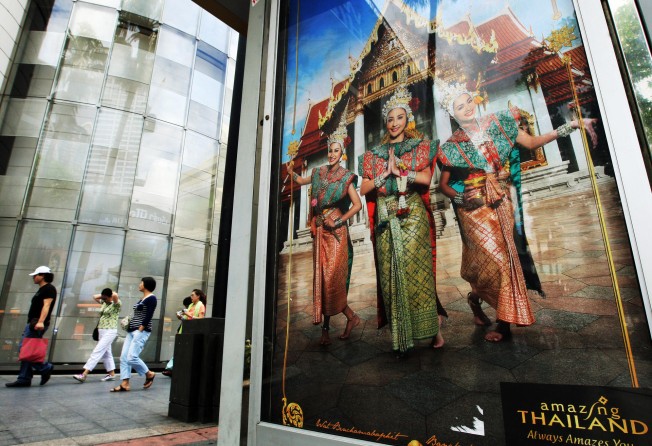Protests hit Thai tourist industry as Chinese stay away
Cancellations to Thailand hit holiday industry during Lunar New Year festival as anti-government protests continue to disrupt Bangkok

Thai anti-government protests that have shut down parts of Bangkok may cost the nation's tourism industry as Chinese visitors cancel trips during the Lunar New Year holiday that starts this week.
Arrivals will fall by half to one million this month, Minister of Tourism and Sports Somsak Phurisisak said last week, with some hotels in the capital and nearby Pattaya and Hua Hin only 30 per cent full. The revenue loss could amount to 22.5 billion baht (HK$5.31 billion), the Tourism Council of Thailand said, with China last week warning its citizens to avoid protest sites and rethink non-essential travel.
"I first planned for a week-long trip to Bangkok to visit my friend there for Christmas, but I had to postpone because of the unrest," said Jia Yanfen, a Beijing-based Chinese language teacher who has never been to Thailand. "I waited and waited hoping to go for Lunar New Year," Jia said. "I had to cancel the trip. Of course I was a bit disappointed, but safety comes first."
Prime Minister Yingluck Shinawatra imposed a state of emergency in Bangkok on January 22 as attacks on protesters escalated and demonstrators blockaded Bangkok's busiest intersections. Concerns about a slump in tourism, which contributes about 10 per cent to gross domestic product, sent the Stock Exchange of Thailand's Tourism and Leisure Index down 3 per cent last week, the worst performer among the bourse's 27 industry groups.
"The biggest concern now is the prolonged protest begins to significantly affect the tourism industry, which was the only bright spot for the economy in 2013," said Porranee Thongyen, the head of research at Asia Plus Securities. "With sluggish consumption and investments, a slump in tourism revenue would further worsen the overall economy," she said.
Bangkok attracted almost 4.2 million visitors from the mainland, Hong Kong and Taiwan last year, a 46 per cent jump from the year before, according to government data, and Somsak said about 300,000 Chinese tourists traditionally visit the country during the Lunar New Year holiday, which begins on Friday.
"We expect to see more flight reductions by airlines, especially from China," he told reporters in Bangkok.
Singapore Airlines will cancel 43 flights between Singapore and Bangkok between January 14 and February 27, and Thai Airways International plans to scrap 25 flights between Hong Kong and the capital, the carriers said last week.
Tourist arrivals will decline by 7.3 per cent to 6.5 million in the first quarter compared with a year earlier, the Tourism Council said in a statement last week. Bangkok arrivals have fallen 5 per cent in January from a year earlier, it said. Since the protests began in October more than 550 people have been wounded and nine killed.
Advance bookings have been crimped by travel warnings from mainland China, Malaysia, Hong Kong, Australia, the Philippines and the US, whose authorities have warned citizens to avoid Bangkok's protest hotspots.
Tour guides from China are in close contact with counterparts in Thailand, Ying Chang Tian, a spokesman for Shanghai-based travel agency Ctrip.com International, said.
The tourism industry rebounded from protests that shut the main airport for almost two weeks in 2008 and turned inner Bangkok into a war zone in 2010, as well as from disasters such as the Indian Ocean tsunami that devastated beach resorts in 2004 and floods in 2011.
"Politics aside, Thailand's fundamentals are exceptionally strong," said Elena Okorochenko, managing director for Asia-Pacific sovereign ratings at Standard & Poor's in Singapore. "Its external debt position is still very sound, its monetary policy is extremely credible."